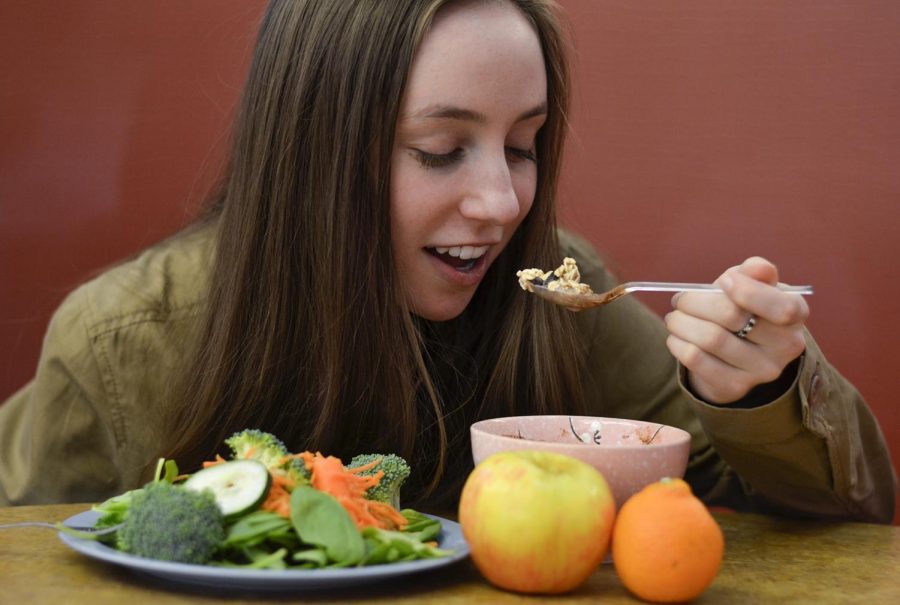Cook your food, raw veganism is too hard
Dorm life, restricted options makes this diet practically impossible
PAIGE CAMPBELL | EVERGREEN PHOTO ILLUSTRATION
Long, pictured above, had trouble coming up with recipes that would satisfy her complicated diet. While veganism comes with multiple health benefits, raw veganism is more strict about excluding any cooked food.
September 18, 2018
“Are you crazy?”
I got this sentiment more than once when I told my friends I was trying a raw vegan diet, and if I’m being honest, I also thought this more than once during my week of raw veganism.
Curious as to what the hype was about and interested in how my body would react, I experimented with the unique way of eating.
Alice Ma, WSU’s on-campus registered dietician of three years and vegan since 2014, neither recommended nor discouraged a fully plant-based diet, but recognized the possible health benefits associated with veganism.
Ma cited her personal reason for choosing veganism as being for the animals. Environmental concerns and health benefits were an added bonus.
“There are certainly quite a few studies that suggest people who are vegetarian or vegan have lower risk of heart disease, even cancer, and all sorts of things,” Ma said. “That’s primarily associated with just when you’re vegetarian or vegan. You naturally eat less meat and so there’s a higher chance that you eat less saturated fat.”
Ma said another likely explanation for correlated health benefits is the fact that vegans don’t consume any cholesterol and typically consume more fruits, vegetables and grains than non-vegetarians or non-vegans.
A lot of stigmas surround the vegan lifestyle, but few could be less accurate than the misconception that vegans don’t get enough protein.
“A couple years ago you mention you’re vegetarian or vegan and all of a sudden everyone else at the table freaks out about your protein intake,” Ma said. “Protein deficiency is definitely not a concern at all because there are so many protein options there.”
Ma suggested including lentils, tofu, beans and nut-based products in your diet to ensure adequate protein intake.
Concerns about vitamin B12 intake are valid because vitamin B12 is almost exclusively found in animal products, Ma said.
Therefore it’s ideal for vegans to include fortified foods in their diet — nutritional yeast, cereals or non-dairy milks — and take vitamin B12 supplements, Ma said.
Ma also said it is possible to be vegan and consume a diet composed solely of junk food, negating any health benefits associated with veganism.
“You can subsist on Oreos and Twizzlers and vegan marshmallows and dark chocolate and white bread,” Ma said.
Raw veganism was a different story. While you can’t exactly consume licorice and white bread as a raw vegan, claims that cooking food gets rid of the enzymes that help the body detox and digest were not fact-based, Ma said.
“Our bodies really have everything they need to digest the food properly,” Ma said. “Not everything needs to be raw or cooked. It definitely helps to get a variety of both raw and cooked foods to get the best of both worlds.”
Personally, my biggest issue with the diet was not the lack of meat or animal products, but my inability to consume cooked food. This made eating at the dining halls difficult.
I was also frequently hungry because it was hard for me to consume enough calories, considering the low-calorie density of most raw vegan foods.
Because of my difficulty eating enough, I chose to do a more flexible version of the diet where up to 20 percent of the food I consumed was cooked.
Finding recipes to make in a dorm proved difficult. I ended up eating a monotonous diet consisting mainly of nuts, fruits and vegetables due to a lack of creativity and kitchen access. By the end of the week my taste buds were already bored.
Ma summed up her advice for healthy eating in a simple way.
“Certainly I advocate for eating more fruits and vegetables and grains, and not necessarily no meat because not everyone is willing to do that,” she said.








